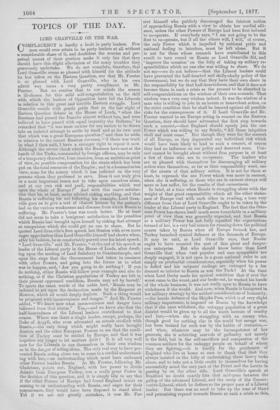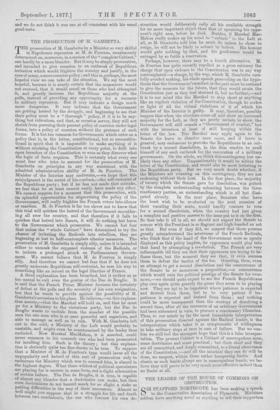TOPICS OF THE DAY.
LORD GRANVILLE ON THE WAR.
COMPLACENCY is hardly a fault in party leaders. Few men would ever attain to be party leaders at all without a considerable share of it, and doubtless the worries and per- petual unrest of their position make it only fair that they should have this slight alleviation of the many troubles they generously undertake. We do not complain, therefore, that Lord Granville seems so pleased with himself for the attitude he has taken on the Eastern Question, nor that Mr. Forster is so pleased with Lord Granville, who in his own adroit way turns a very pretty compliment to Mr. Forster. But we confess that to our minds the season is ill-chosen for this mild self-congratulation on the skill with which the leaders of Opposition have led the Liberals in relation to this great and terrible Eastern struggle. Lord Granville recalls with gentle pride that on the last night of Eastern Question debate in the House of Lords, "when the Russians had passed the Danube almost without loss, and were believed to have passed with equal impunity the Balkans," he remarked that "it was most unwise for any nation to be drawn into an isolated attempt to settle by itself and at its own cost that which was a great European question ;" and then he adds, in relation to the recent Russian reverses, "if there was truth in what I then said, I have a stronger right to repeat it now. Although the severe check which the Russians have met at the hands of the Turks, commanded by foreign officers, may be only of a temporary character, loan conceive, from an ambitious point of view, no possible compensation for the strain which has been put on the total resources of the Empire ; and in a humanitarian view, none for the misery which it has inflicted on the very persons whom they professed to save. Does it not truly give us a most important lesson not to take upon ourselves alone, and at our own risk and peril, responsibilities which rest upon the whole of Europe ?" And with this suave satisfac- tion that he, at least, never advised risking anything, and that Russia is suffering for not following his example, Lord Gran- ville goes on to give a sort of clinical lecture by the patient's bed on the various weaknesses and diseases from which Russia is suffering. Mr. Forster's tone was much better. He at least did not seem to take a benignant satisfaction in the penalties which Russia had brought upon herself by risking that attempt at compulsion which she could get no one to share. But he quoted Lord Granville's first speech last Session with even more eager approbation than Lord Granville himself had shown when, after his fashion, he BO comfortably purred over his latest speech. "Lord Granville," said Mr. Forster, "at the end of his speech as leader of the Liberal party in the House of Lords, after dwell- ing upon the sending of Lord Salisbury to Constantinople, and upon the steps that the Government had taken in common with other Powers, and going into the future as to what was to happen, said, 'Are you going to do nothing ? If you do nothing, either Russia will follow your example and also do nothing, or if the Christian populations of Turkey are left in their present oppressed condition, Russia may act by herself,' To quote the exact words of the noble lord, Russia may be induced to act upon the declaration made by the Emperor at Moscow, which all would deeply deplore. Such a thing would be pregnant with inconvenienee and danger." And Mr. Forster added, "We know now what inconvenience and danger have followed from that course." Yes,—and we know also that the half-heartedness of the Liberal leaders contributed to that course. Where was there a single leader, except, perhaps, the Duke of Argyll, who even advocated an entente cordials with Russia,—the only thing which might really have brought Austria and the other European Powers to see that the condi- tion of Turkey muse be settled by Europe, and that it was hopeless any longer to let matters drift ? It is all very well now for the Liberals to sun themselves in their own wisdom as to the danger of acting alone. The only real way to have pre- vented Russia acting alone was to come to a cordial understand- ing with her,—an understanding which must have embraced other Powers besides Russia. As Mr. Forster, following Mr. Gladstone, points out, England, with her power to divide Asiatic from European Turkey, was a really great Power in the decision of this question, and it is simply idle to say that if the other Powers of Europe had found England intent on coming to an understanding with Russia, and eager for their concurrence, they would have been disposed to stand aloof. Yet if we are not greatly mistaken, it was Mr. For- ster himself who publicly discouraged the faintest notion of approaching Russia with a view to obtain her cordial alli- ance, unless the other Powers of Europe had been first induced to co-operate. If everybody says, "I am not going to be the first to co-operate, but if all the others will, I will," of course, the only Power which is impelled by national pride and national feeling to interfere, must be left alone. But it is not for those whose counsels have contributed to this result to turn round on Russia as Lord Granville did, and improve the occasion' on the folly of taking up solitary re- sponsibilities which no one else was willing to share. We do not say—we do not believe—that the Liberal leaders could have prevented the half-hearted and shilly-shally policy of the Government, but we do say that they have their own share in the responsibility for that half-heartedness, and that it does not become them in such a crisis as the present to be absorbed in self-congratulations on the wisdom of their own counsels. That wisdom was a very easy wisdom indeed. It was the wisdom of a man who is willing to join in an heroic or benevolent action, on the strict condition that he shall be insured against all possible risks for the consequences of it. If Lord Granville and Mr. Forster wanted to see Europe acting in concert on the Eastern Question, they should have advocated the first step towards such a concert,—that England should openly join the one Power which was willing to say firmly, "All these iniquities shall and must cease." But though they were for the concert of all Europe, as they deprecated any individual risk which would have been likely to lead to such a concert, of course they had no influence on our policy and deserved none. Con- cert cannot be brought about without firm purpose in at least a few of those who are to co-operate. The leaders who are so pleased with themselves for discouraging all solitary action were themselves, so far as their responsibility went, one of the causes of that solitary action. It is not for them at least, to reproach the one Power which was more in earnest, when she is suffering, as those who are in earnest always will more or less suffer, for the results of that earnestness.
In brief, at a time when Russia is struggling alone with the weight of that great responsibility which all the other states- men of Europe vied with each other in evading, a tone very different from that of Lord Granville ought to be taken by tha leader of the Liberal party in England. The fact that the Otto- man Power has shown itself much more formidable in a military point of view than was generally expected, and that Russia as a military Power has not fully equalled the expectations formed of her, is a very bad reason for running down the political course taken by Russia when all Europe forsook her, and Turkey launched cynical defiance at the demands of Europe. It may be said, as Lord Granville says, that Russia ought to have counted the cost of this great and danger- ous enterprise. But who should know better than Lord Granville that when vast popular and race sympathies are deeply engaged, it is not open to a great national ruler to act simply on prudential considerations, especially when his power is defied and his subjects' feelings are outraged by a foe deemed so inferior to Russia as was the Turk ? At the time when Lord Derby made his cynical condition that if ever the worst came to the worst, and war broke out, he washed his hands of the whole business, it was not really open to Russia to have withdrawn if she would. And now, when Russia is hampered in her military strategy by the noblest considerations of humanity, —the heroic defence of the Shipka Pass, which is of very slight military importance, is imposed on Russia by the knowledge that if she once withdrew, the unhappy population of a great district would be given up to all the worst horrors of cruelty and lust,—when she is struggling with an enemy who, though good for nothing else in the world but savage war, has been trained for such war by the habits of centuries,— and when, whatever may be the incompetence of her generals, she is achieving marvels of gallantry not merely in the field, but in the self-sacrifices and compassion of the common soldiers for the unhappy people on behalf of whom they are fighting,—it is hardly for the gentlemen of England who live at home at ease to thank God that they always insisted on the folly of undertaking these heavy tasks alone, and to take not a little credit to themselves for having successfully acted the easy part of the Priest and the Levite in passing by on the other side. Lord Granville's speech at Bradford no doubt exactly hits that mid-pace between the gallop of the advanced Liberal, and the creep of the Conser- vative-Liberal, which he defines as the proper pace of a Liberal leader. But there was no need to take up the tone of bland and patronising reproof towards Russia at such a crisis as this, and we do not think it was one at all consistent with his usual good-taste.































 Previous page
Previous page